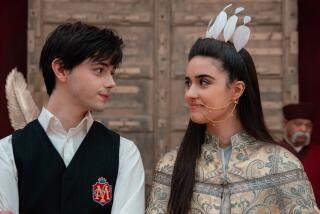A new foursome in fugal fast lane
- Share via
Bach: “The Art of Fugue”
Emerson String Quartet (Deutsche Grammophon)
****
“The Art of Fugue” is usually heard as a keyboard work -- and a lumbering keyboard work at that. Yet Bach did not specify any instruments or speeds for his last, lengthy encounter with counterpoint, and a string quartet seems more suited than most configurations for its four interweaving lines of music. The Juilliard Quartet established a benchmark for quartet versions in recent years (Sony); indeed, Juilliard violist Samuel Rhodes lent his Emerson counterpart Lawrence Dutton his tenor viola for notes that lay too low for the regular viola. But the Emersons simply blow the Juilliards away with their clarity of line, rich collective tone and driving vigor, taking the tempos consistently faster and getting it all down on one jam-packed 80-minute CD. You have to go to William Malloch’s fanciful orchestration of the 1970s, “The Art of Fuguing” (Sheffield Lab), to find a recording that radiates as much sheer joy as this one.
--Richard S. Ginell
Teenage pianist
shows promise
Rachmaninoff: Five “Etudes-Tableaux,” from Opus 39 and Opus 33
Ravel: “Sonatine”; “Miroirs”
Lise de la Salle, piano. (Naive)
** 1/2
Recorded last year, when La Salle was 14, this debut recording by the gifted French pianist shows high accomplishment, strong promise and some finesse. Yet one does not at this point hear the sound-variety and tone-coloration characteristic of these composers’ broad musical canvases. Thus, for now, this is an impressive and serious down payment on future achievement.
-- Daniel Cariaga
Heavenly
Slavic singing
“The Powers of Heaven”: Orthodox Music of the 17th and 18th Centuries
Estonian Philharmonic Chamber Choir. Paul Hillier, director. (Harmonia Mundi)
***
A luminous collection. The a cappella Slavic church repertoire, with its luxuriant polyphony, imaginative part-singing and the concerto-like format mastered by Dmitry Bortnyansky, glows in the throats of this 31-voice ensemble led knowingly by a contemporary master in the choral field. Bortnyansky dominates these 11 selections, although Hillier also includes works by Sarti and Galuppi, two of the Italians whose Russian sojourns contributed a quasi-operatic flavor to the orthodox liturgical literature. The Estonians sing in an appropriately devotional manner; the remarkably homogeneous and refined texture of their sonority belies more than one cliche about Eastern European vocal production.
-- Allan Ulrich
Old band,
new director
Mozart: “Night Music”
“Eine Kleine Nachtmusik,” K. 525; Adagio and Fugue in C minor, K. 546; Minuet and Trio, K. 485a; Serenade in D, K. 239; “A Musical Joke,” K. 522.
The English Concert. Andrew Manze, conductor. (Harmonia Mundi)
**
As of July, Manze is the new director of the distinguished British ensemble, the high-achieving string band now 30 years old. This collection excels in correctness, neatness and virtually immaculate musical surfaces but lacks much in spirit and spontaneity. The playing is admirable, but without spunk. No one, it would seem, is having any fun.
--D.C.
More to Read
The biggest entertainment stories
Get our big stories about Hollywood, film, television, music, arts, culture and more right in your inbox as soon as they publish.
You may occasionally receive promotional content from the Los Angeles Times.










